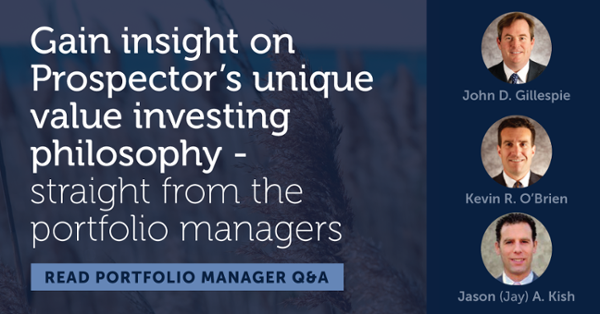Portfolio Managers John Gillespie, Jason Kish and Kevin O’Brien sat down and answered 11 questions regarding the team’s unique value-investing philosophy, lessons learned from past experiences and thoughts on running their business. In today's blog, they answer two questions regarding the importance of firm culture and incentives.
Q. What is the culture of Prospector Partners like? What is it like working in Guilford, Connecticut - a fair distance outside New York City?
John: I would describe our culture as “open investment debate.” We all sit together in a one-floor building with the trading desk in the center. Decision making is transparent, and contrary views are encouraged and aired openly. We must be doing something right, as employee turnover has been consistently low during our more than two-decade history.
Jay: We have a very open-door, collegial work environment at Prospector. Guilford is a great community, and a bunch of us have made it our home. John purposely set up the company (initially in Hartford) a good distance away from Manhattan, in an effort to avoid Wall Street group think. We pride ourselves on doing independent research and avoiding being overly swayed by the “sell-side.” Yet, we are right between New York and Boston, and can easily get to industry conferences, etc., where we tend to go when we are able to have multiple one-on-one meetings with company managements.
Q. Do you have personal assets invested in the funds? Does that affect the way you think about investing and down-side protection?
John: More than 20% of the money managed by Prospector Partners is our own. We eat our own cooking. The risk tolerances in the portfolios are reflections of the principals’ risk appetite for which their “skin in the game” represents the vast majority of each Prospector associates’ liquid net worth. We also pay close attention to after-tax results and have been successful over the life of the funds to deliver advantageous tax consequences to our investors. My father, a trust and estate attorney, always advised that “you can’t eat pretax performance!”
The questions from this blog came from our "Q&A with the Portfolio Managers". We encourage you to explore the additional in-depth Q&As here.
Additional topics in the full Q&A include:
- Why portfolio managers should have their personal assets invested alongside shareholders
- Tips on avoiding Wall Street group think
- How our approach to equities is similar to high-quality bond managers


